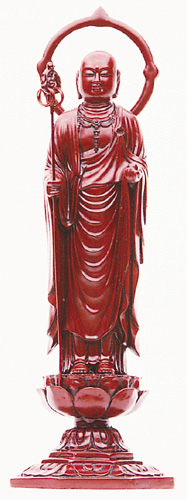| About Us | Site Map | Contact Us |
|
|
| Home | Schools & Teachings | Dharma Centers | Buddha & Bodhisattva Directory | Cosmos |
|
|
Buddha and Bodhisattva Directory
Ksitigarbha

Ksitigarbha literally means "Womb of the Earth " or "the one who encompasses the earth". According to the "Ten Wheel of Earth Womb Sutra", the name represents this Bodhisattva's personality which include patience, stillness, hardness and vastness (like earth), deepness and profundity (like womb). The implication is that our mind creates all Dharma and accommodates all matters just like the earth womb. It is the foundation on which everything grows, including the immeasurable treasures - the Buddhist Way. Ksitigarbha is the bodhisattva who saves suffering beings in the Hell, therefore, is often referred to as the Bodhisattva of the Hell beings because of his vow to not achieve Buddhahood until "all the Hells are empty". This vow actually encompasses all sentient beings. Ksitigarbha is the only Bodhisattva portrayed as a monk. He has a monk's pilgrim's staff with six rings, which signifies that Ksitigarbha stands by all beings in the six paths of existence. According to the "Earth Womb Sutra", Ksitigarbha was appointed by Shakyamuni to be the headmaster of Buddhism on Earth during the period from the Nirvana of Shakyamuni to the advent of Maitreya, the next Buddha born on Earth. As the master of the six paths (Hell, Ghost, Animal, Man, Asura and Deva) he is described as savior for all beings from suffering. With this responsibility, his status is well-respected by all Buddhas and other beings in the Ten Dharma Realms including human beings. Because Ksitigarbha is connected to deliver sentient beings wandering astray in the Hell, this expresses an extremely profound and esoteric aspect of the Bodhisattva's compassionate activity. This deepest compassion is working from the highest to the lowest. He is thus the supreme embodiment of spiritual optimism, the most profound development of Mahayana universalism. Over one thousand years ago, a Korean Buddhist monk named Gin-Chau-Jue went to Jo-Hwa Mountain in China for Dharma practice around in mid-Tong Dynasty. Regional followers believed Gin is the emanation of Ksitigarbha therefore, after he passed away, start building temples to worship him. Since then Jo-Hwa Mountain becomes the sacred site of Ksitigarbha Bodhisattva. In China, Ksitigarbha is known as Di-Tsang, in Japan as Jizo. Ksitigarbha is especially popular in Japan as the savior of the souls of dead children, particularly aborted ones. He is more popular in the Far East than he ever was in India and Tibet. |
| About Us | Free Books | Site Map | Contact Us | ||
| Copyright © 1999-2020 Manjushri. All Rights Reserved. | ||
